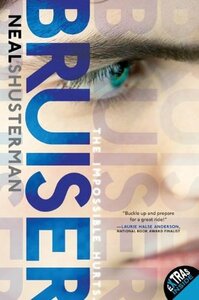Take a photo of a barcode or cover
I really liked the concept and loved reading Brewster's chapters with their poetic structure. In general, it was a good book, but the pacing was incredibly drawn out. I felt bored through page 80, and once it finally picked up, it still felt like it dragged. I'd say about 40% of this book was incredible - the rest just felt like a slow crawl towards the ending that I felt ready for dozens of pages before it came.
A very intense book, that at first appears to be another in the paranormal, but which moves toward an analysis of whether it would be good to go through life without feeling pain, physical or emotional. There's elements of The Giver, selfless sacrifice, and even helicopter parents in this. Alternating chapters from four of the characters make for an unexpectedly interesting journey. I especially liked Cody's chapters, as their youthful innocence belied a deep wisdom.
It was a quick read, but left a lasting impression.
It was a quick read, but left a lasting impression.
Shusterman definitely comes up with interesting concepts, though I think he sometimes stumbles carrying them all the way through. Brewster, known as the Bruiser, is hulking, menacing kid who mainly keeps to himself and avoids friendships. However, Bronte falls in love with him and her twin brother, Tennyson, becomes Brewster's friend. In the process the three teens become entwined in each others lives. Bronte and Tennyson learn that the reason Brewster avoids relationships is because when he cares about someone he absorbs their pain - mental and physical. Those he loves feel no pain and suffer no injury, but Brewster feels it all.
The premise is an interesting metaphor for the paradox of human relationships - that by opening ourselves to love we also open ourselves to pain. And I was right there for most of the book, but I found the ending maudlin and overblown.
The premise is an interesting metaphor for the paradox of human relationships - that by opening ourselves to love we also open ourselves to pain. And I was right there for most of the book, but I found the ending maudlin and overblown.
challenging
inspiring
reflective
fast-paced
This book surprised me, I liked it much more than I thought I would. It sounded like it was going to be a cheesy romance novel, it is so much more than that.
It has a ton of great messages in it as well. It promotes owing up to your own life, make mistakes but learn from them. It has an amazing friendship/relationship with its own learning curves.
It deals with parental divorce and how it affects everyone and everything involved. It also shows how the parents feel when kids are involved and how eventually it needs to be dealt with.
This book was beautifully written, with some poetry aspects added in. It was from multiple perspectives and multiple teenage issues.
I am so glad I read this book. Even at 28 years old this book held meaning to me. Neal Shusterman really knows how to hit his readers and make the feeling last.
It has a ton of great messages in it as well. It promotes owing up to your own life, make mistakes but learn from them. It has an amazing friendship/relationship with its own learning curves.
It deals with parental divorce and how it affects everyone and everything involved. It also shows how the parents feel when kids are involved and how eventually it needs to be dealt with.
This book was beautifully written, with some poetry aspects added in. It was from multiple perspectives and multiple teenage issues.
I am so glad I read this book. Even at 28 years old this book held meaning to me. Neal Shusterman really knows how to hit his readers and make the feeling last.
This was okay for a while, then it got predictable. Then it got draggy and pedantic and heavy-handed. The second half of the book got a little bit lame. Just not my thing, I guess.
I hope that people who read this give the Unwound dystology a chance! If I'd read this first, I would have missed out on Connor and Risa. This book is okay, but definitely not as good as the Unwound series.
Am I the only one who got some serious Jesus-vibes over the whole pain-transferring thing?! I liked the book just fine, but I think the end was missing something.
When Bronte starts dating Brewster, her twin brother Tennyson is concerned for her safety. He and most of the kids at school are convinced that "the Bruiser" is trouble. Bronte says that Brewster has been misunderstood, and as Tennyson slowly gets to know him, he realizes that Brewster is not the psychopath that the kids at school have labeled him to be. But there is something odd about him... how is it that when Bronte injures herself, she quickly gets over it and the injury is transfered to Brewster's body? And not just Bronte... when Brewster attends one of Tennyson's lacrosse games, Tennyson comes away unscathed, but Brewster is doubled over in pain. In the background is the slowly imploding marriage of Tennyson's and Bronte's parents, and the fact that when Brewster's around, things seem better somehow... at least, until it becomes apparent that Brewster is not only absorbing the physical injuries of those he cares for, but their mental anguish as well. A thought-provoking novel about the ethics of carrying another's pain.



